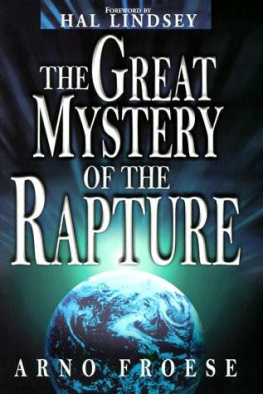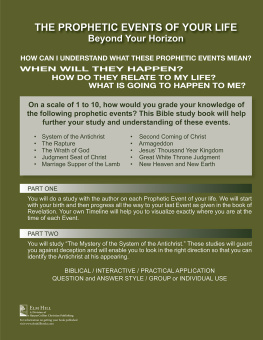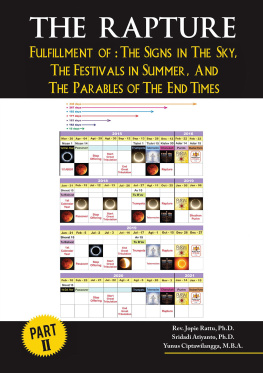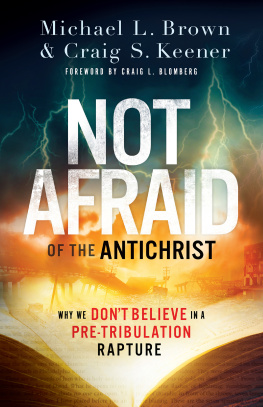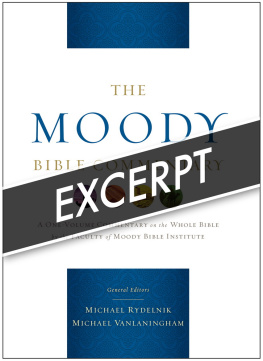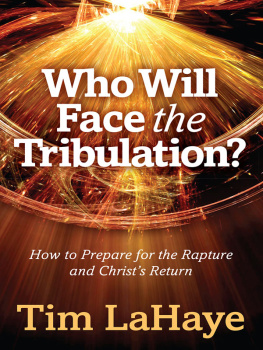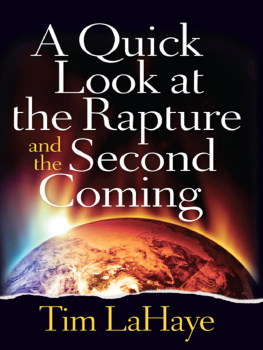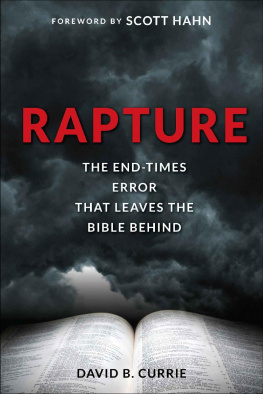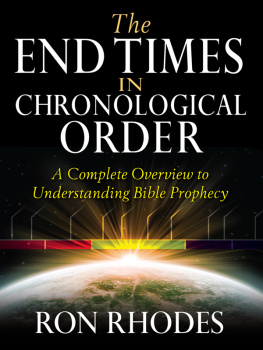
This book is dedicated to the Church of Jesus Christ worldwide.
It is intended to contribute toward a better understanding of Gods counsel to men based on the Scripture.
The author does not benefit through royalties from the proceeds of the sale of this book. All received funds are reinvested for the furtherance of the Gospel.

FOREWORD BY
HAL LINDSEY
This book is an articulate, Bible-based voice highlighting the most important event in the history of the Church. Quite fittingly, Arno Froese has entitled this work, The Great Mystery of the Rapture.
Paul, in his letter to the Corinthians, wrote the following, "Behold I shew you a mystery." The revelation of this apostle, and of other authors inspired by the Holy Spirit, uncover the "mystery" of the Rapture and can be found throughout the pages of this complete examination.
It is evident that the author has invested countless hours and exhaustive research into this comprehensive biblical study in order to reveal the mystery of this great and unprecedented event.
Arno Froese also exposes the confusion associated with the doctrine of the Rapture. The result? A clear exposition of the greatest hope held by Christians throughout the agesthe imminency of Jesus' coming!
May the Lord by His grace add His blessing to the reading of this noteworthy book.

Hal Lindsey

CONTENTS
THE REALITY OF THE RAPTURE
ISRAEL: THE SURE SIGN OF THE RAPTURE
THE LORD HIMSELF SHALL DESCEND FROM HEAVEN
WITH THE VOICE OF THE ARCHANGEL
WITH THE TRUMP OF GOD
THE DEAD IN CHRIST SHALL RISE FIRST
THEN WE WHICH ARE ALIVE
ISRAEL: THE BEGINNING OF THE CHURCH
THE COMFORT OF THE RAPTURE
THE SIGNIFICANCE OF THE NUMBER EIGHTEEN
WHICH IS THE REAL CHURCH OF JESUS CHRIST?
THE COMING OF THE LORD
ISRAEL AND PEACE
PROPHETIC SHADOWS OF THE RAPTURE
THE BELIEVERS' LAST BATTLE

INTRODUCTION
T he book you are about to read, The Great Mystery of the Rapture, has been my on-going project for many years. It was not my initial intention to write this book when I first started to study this important subject. But during the years,
I had prepared many messages and so ultimately decided to arrange the material into a book form.
Virtually all Bible scholars and theologians agree that the coming of Jesus was prophesied in the Old Testament. Jewish scholars in particular have searched the Old Testament for many thousands of years. They discovered that the long-awaited Messiah would lead Israel to its ultimate glory as prophesied by Moses, "For thou art an holy people unto the LORD thy God, and the LORD hath chosen thee to be a peculiar people unto himself, above all the nations that are upon the earth" (Deuteronomy 14:2). The Jews of the Old Covenant and the Church of the New Covenant agree that such a prophecy has not yet been fulfilled.
Moses, likewise, wrote down the words God gave to him regarding the coming Messiah, "The LORD thy God will raise up unto thee a Prophet from the midst of thee, of thy brethren, like unto me; unto him ye shall hearken" (Deuteronomy 18:15). These words were simple to understand; a prophet would come to Israel proclaiming the words of
God, and would establish Israel into the undisputed leader of all the nations of the world.
However, further study revealed a great controversy, particularly in Isaiah 53. In this section of Scripture, the Messiah is not pictured as the King but rather as a person rejected by the people and shamefully executed as an innocent man.
It became increasingly difficult for many Jewish scholars to avoid recognizing the Messiah as the sacrificial Lamb. The details of His life, crucifixion, and death are clearly given. Thus the question arose, "How can the Messiah lead Israel to glory yet simultaneously become a despised and rejected person to be led as a lamb to the slaughter?" With these facts in mind, we clearly recognize that Jesus must come in two stages. First to die for the sins of mankind as the innocent sacrificial Lamb, establishing the New Covenant, as prophesied in Jeremiah 31:31, "Behold, the days come, saith the LORD, that I will make a new covenant with the house of Israel, and with the house of Judah." Then to return in great power and glory to fulfill the original promise which will result in the Lord ruling the nations with a rod of iron, elevating Israel as the supreme nation on planet Earth.
A closer look at the Second Coming in the New Testament also reveals two comings. After His ascension into Heaven, we read of two men in white apparel telling the disciples, "...Ye men of Galilee, why stand ye gazing up into heaven? this same Jesus, which is taken up from you into heaven, shall so come in like manner as ye have seen him go into heaven" (Acts 1:11). This was a heavenly message with the
assurance that Jesus would come back to earth, more specifically to the Mount of Olives, the exact spot from which He left, to fulfill this prophecy. Zechariah 14:4 confirms this, "... his feet shall stand in that day upon the mount of Olives, which is before Jerusalem on the east...." This is the Second Coming of Christ.
It was quite natural for the Jewish disciples to assume that Jesus would literally and physically return to the Mount of Olives at any time to establish the kingdom of God in the land of Israel. Just before He ascended, they asked Him, "Lord, wilt thou at this time restore again the kingdom of Israel? (Acts 1:6). Jesus answered, "...It is not for you to know the times or the seasons, which the Father hath put in his own power' '(Verse 7). He tells them to wait for the empowering of the Holy Spirit, to proclaim the Gospel in Jerusalem, Judaea, Samaria, and to the outermost parts of the earth.
When we study the verses relating to the Second Coming, we should notice that it is impossible for Jesus to come unless the light of the world is first removed from the earth. That is the first phase of the Second Coming, generally known as the Rapture.
Jesus revealed part of this mystery to His disciples, " .. It is expedient for you that I go away: for if I go not away, the Comforter will not come unto you..." (John 16:7). This exchange had to take place. Jesus ascended into Heaven so that the Comforter, the Holy Spirit, would come and "...abide with you [the disciples] for ever" (John 14:16).
This opens our understanding to a further revealed mystery; namely, that Jesus had to depart in order for the Comforter to come. It stands to reason that Jesus cannot come back to earth unless the abiding Comforter is taken out of the way.
In 2nd Thessalonians 2 the apostle Paul, inspired by the Holy Spirit, speaks of two events, "the coming of our Lord Jesus Christ, " describing the Second Coming, and "our gathering together unto him" describing the Rapture. It is vital to note the very distinct differences between the two. In the first case, Jesus will literally and physically return to the Mount of Olives. In the second case, we will be gathered unto Him, meaning we will come to Him.

